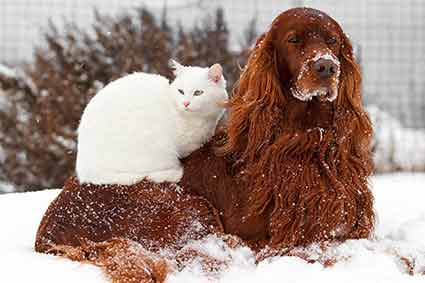Keeping Animals Healthy in the Winter

Keeping Animals Healthy in the Winter
Winter can be a harsh time for everyone, animals included. Diseases spread more easily when everyone is cooped up inside; cold weather can be hard on pet feet and wildlife struggle to survive. Here are a few suggestions to keep the animals in your life healthy during the long winter months, which have only just begun!
Plan Ahead When Boarding Your Dog
If you are making a quick trip to somewhere sunny and need to board your dog at the kennel, make sure he is up to date on vaccinations and is well protected against infectious diseases. In any place where dogs congregate, boarding kennels, doggie daycare or dog shows, infectious diseases can spread quickly. Ask your veterinarian if she recommends one of the canine influenza vaccines. Vaccines are available for both strains of the canine influenza virus and also against Bordetella bronchiseptica, a common bacterial cause of kennel cough. You might want to check and see if the kennel serves your dog’s usual fare. If not, consider sending his food to the kennel to prevent tummy upset from an abrupt diet change.
Provide Food and Shelter for Outdoor Cats
My neighborhood in New York City does not have many outdoor cats, but outside of Manhattan, whole colonies of cats are threatened by inclement weather. Some animal shelters and rescue groups can provide shelters for these outdoor cats. If you are the caretaker of an outdoor cat, you can create a weather proof shelter from a large plastic tub. Here are directions provided by the Danbury Animal Welfare Society for a do it yourself shelter. If you live in NYC, the Mayor’s Alliance NYC Feral Cat Initiative has workshops on building cat shelters.
Also remember to feed dry food in the winter as canned food can freeze and become inedible. You may also need electric water heaters to keep fresh water available even on subzero days.
Backyard Birds
Winter time brings beautifully colored birds like blue jays and cardinals to backyard feeders. To keep your pretty winter visitors as healthy as possible, follow these suggestions from Oregon State Wildlife Veterinarian Dr. Colin Gillin:
- Use feeders made from non-porous material like plastic, ceramic, and metal. These are less likely than wood to harbor bacteria and other diseases, which can kill backyard birds.
- Clean feeders, water containers and bird baths monthly by rinsing with soapy water and then dunking the feeder in a solution of one third cup of chlorine bleach per one gallon of water.
- Install multiple feeders to prevent all visiting birds from congregating in one place where illness can readily spread.
If you find injured wildlife, birds or mammals, don’t try to rehabilitate them yourself. To find the appropriate rescue group, check this blog post about injured pets and wildlife for resources.

































